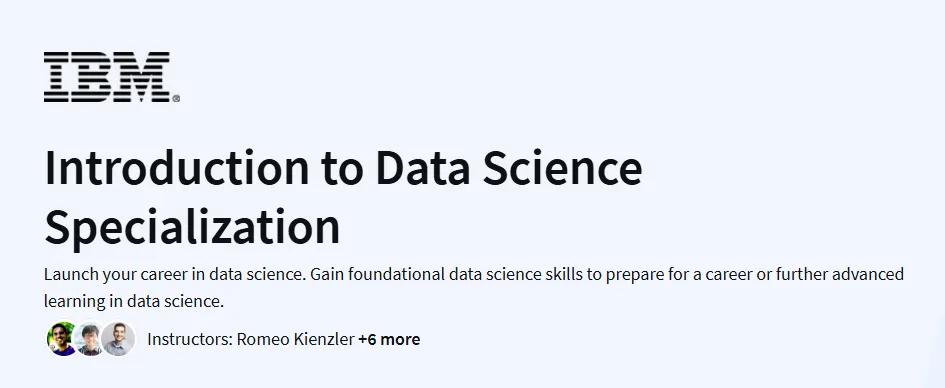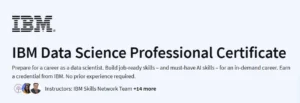What you will learn in Introduction to Data Science Specialization Course
- Understand the fundamentals of data science, statistics, and machine learning.
- Learn how to work with structured and unstructured data using industry-standard tools.
- Gain hands-on experience with Python, SQL, and data visualization techniques.
- Explore key concepts like data wrangling, exploratory data analysis (EDA), and feature engineering.
- Understand machine learning basics, including regression, classification, and clustering.
- Work on real-world datasets and develop insights using practical case studies.
- Complete a capstone project to apply data science skills in a business scenario.
Program Overview
Foundations of Data Science
⏱️4-6 weeks
- Learn the core principles of data science and its applications across industries.
- Understand different types of data, databases, and data collection methods.
- Introduction to Python programming and SQL for data manipulation.
Data Cleaning & Exploration
⏱️ 6-8 weeks
- Learn data wrangling techniques to clean and prepare messy data.
- Work with Pandas and NumPy for data transformation.
- Understand how to identify outliers, missing values, and inconsistencies.
Exploratory Data Analysis (EDA)
⏱️ 6-8 weeks
- Apply statistical methods to extract insights from data.
- Use Matplotlib and Seaborn for data visualization.
- Learn how to create histograms, scatter plots, and correlation heatmaps.
Machine Learning Basics
⏱️ 8-12 weeks
- Introduction to supervised and unsupervised learning techniques.
- Learn about linear regression, decision trees, and clustering methods.
- Apply machine learning models using Scikit-learn and TensorFlow.
Capstone Project
⏱️ 12-15 weeks
- Work on a real-world data science project from start to finish.
- Use Python, SQL, and visualization tools to analyze and interpret data.
- Present findings through reports and dashboards.
Get certificate
Job Outlook
- High Demand: Data science is among the fastest-growing careers, with a 35% job growth rate by 2030.
- Salary Potential: Entry-level data scientists earn $85K – $120K per year, with experienced professionals making $150K+.
- Industry Applications: Data science is widely used in finance, healthcare, tech, and marketing.
- Career Opportunities: Prepares learners for roles like Data Scientist, Data Analyst, Machine Learning Engineer.
Explore More Learning Paths
Build a strong foundation in data science with these curated programs designed to help you master core concepts, methodologies, and practical tools for analyzing and interpreting data.
Related Courses
Foundations of Data Science Course – Learn the fundamental principles of data science, including data collection, cleaning, and analysis techniques.
Data Science Methodology Course – Understand structured approaches for solving data-driven problems and applying analytical frameworks effectively.
Tools for Data Science Course – Gain hands-on experience with Python, SQL, and essential tools for data preparation, visualization, and analysis.
Related Reading
Gain insight into how effective data management underpins successful analytics:
What Is Data Management? – Learn the importance of organizing, storing, and maintaining data to ensure accurate analysis and actionable insights.
Specification: Introduction to Data Science Specialization Course
|
FAQs
- It’s a beginner-level, four-course specialization offered by IBM on Coursera, aimed at helping you kickstart a career in data science or build a robust foundation for further studies. No prior experience is required to enroll.
- The specialization covers foundational topics including data science basics, common tools like JupyterLab, RStudio, GitHub, and Watson Studio, data science methodology, and how to query cloud databases with SQL from Python.
- It’s scored 4.7 out of 5, based on over 13,000 reviews, and supports flexible learning—aiming for completion in about 4 weeks at 10 hours per week.
- Perfect for complete beginners with no prior programming or data experience.
- It’s designed to gradually introduce learners to the mindset, methodology (like CRISP-DM), and toolkit of a data scientist.
- You’ll gain a solid overview of what data science and machine learning involve, how they’re applied, and the different roles within the field.
- Gain hands-on familiarity with:
- Development tools: JupyterLab, RStudio
- Collaboration tools: GitHub
- Cloud workspaces: Watson Studio
- Data querying: SQL via Python notebooks
- Important thinking and problem-solving frameworks like CRISP-DM methodology.
- The recommended schedule is about 4 weeks at 10 hours per week, but it’s fully self-paced, so you can accelerate or spread it out
- Other sources estimate it may take around 4 months at a gentler pace of 3 hours per week.
- You can audit content for free or pay if you want graded assessments and a certificate.
- It’s highly rated and widely accessible—great for building confidence and foundational knowledge in data science.
- Learning tools like Jupyter, SQL, GitHub, and Python is practical and transferable across many roles.
- It’s a solid stepping-stone, but not comprehensive—real-world mastery requires deeper learning and practice. Online forums discuss how specializations like this help start careers, yet emphasize that projects and continued learning are key.





